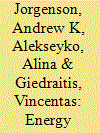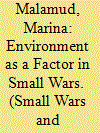| Srl | Item |
| 1 |
ID:
127998


|
|
|
|
|
| Publication |
2014.
|
| Summary/Abstract |
Sustainability is fundamentally a challenge of tradeoffs. In order to improve human well-being through economic development we consume nonrenewable energy and other natural resources, relying on a broad range of ecosystem services. Enhancing sustainability requires reducing the "energy intensity of human well-being (EIWB)": the amount of energy used per unit of human well-being. In this study we employ longitudinal analysis techniques to assess the temporally dynamic relationship between EIWB and economic development for a sample of 12 Central and Eastern European (CEE) nations for the 1992 to 2010 period. These are nations that have recently transitioned, which is still an ongoing process, from socialist command economies to market demand economies. During this ongoing transition, many of them have experienced declines in energy intensity, coupled with increased energy efficiency, while human well-being has improved considerably. The results of the analysis indicate that the relationship between EIWB and economic growth in CEE nations is complex and has changed dramatically through time. Of particular importance, the later years of the study exhibit an increasingly sustainable relationship between EIWB and economic development. The findings point to future possibilities for relatively more harmonious relationships between development, human well-being, and the natural environment.
|
|
|
|
|
|
|
|
|
|
|
|
|
|
|
|
| 2 |
ID:
158976


|
|
|
|
|
| Summary/Abstract |
This research paper analyzes the relationship between small wars, insurgency, and the natural environment. Existing literature and data are organized into four behavioral patterns: the resource-based wars accounts for the fight over natural resources; the warfare ecology paradigm refers to non-premeditated damage in preparation for as well as during and after conflicts; the environment as a target discusses intended attacks on the ecosystem; and the insurgency–climate intersection pattern denotes a deviation in climate change that increases the frequency of intergroup violence. The main premise is that small wars emerge when the ecosystem becomes a political asset.
|
|
|
|
|
|
|
|
|
|
|
|
|
|
|
|